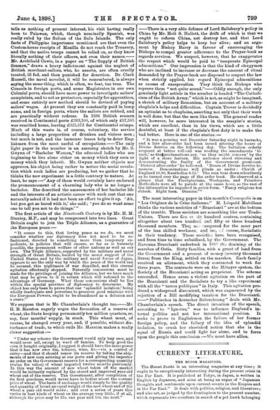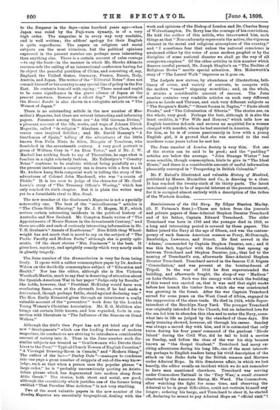CURRENT LITERATURE.
THE MINOR MiGkEINES.
The Hansel, Zasshi is an interesting magazine at any time; it ought to be exceptionally interesting during the present crisis in the Far East. It is published at Tokyo, in Japan, is written in English by Japanese, and aims at being an organ of "Japanese thoughts and sentiments upon current events in the Empire and in the Far East." It deals with politics, religion, and literature; and also art, as judged by the frontispiece to the present number, which represents two courtiers in search of a pet hawk belonging to the Emperor in the days—nine hundred years ago—when Japan was ruled by the Fuji-wars dynasty, is of a very high order. The magazine is in every way very readable, and is well written; the editors' apology for their English is quite superfluous. The papers on religious and social subjects are the most vivacious, but the political opinions expressed in the present number are perhaps more interesting than anything else. There is a certain amount of calm courage —to say the least—in the manner in which Mr. Shosho Akimoto recommends the calling of an international conference having for its object the peaceful partition of China, and consisting of, say, England, the United States, Germany, France, Russia, Italy, Austria, and Japan. The writer of the "Editorial Notes" does not commit himself or his country to any special line of policy in the Far East. He contents himself with saying : "There must and ought to be some significance in the grave silence of Japan at the present juncture. Beware of a silent dog." The patriotism of the Hansei Zasshi is also shown in a eulogistic article on "The Women of Japan."
There is no outstanding article in the new number of Mac- millan's Magazine, but there are several interesting and informing papers. Foremost among these are "An Old German Divine," a pleasant account of the life, works, and ways of Johann Ulrich Megerlin, called "in religion" Abraham a Sancta Clara, whose verses once inspired Schiller ; and Mr. David Hannay's "A Gentleman of Spain," telling of the adventures of the little known Don Felix Nieto de Silva, Marquis of Tenebron, who flourished in the seventeenth century. I very good portrait is given of William Cory in "An Eton Tutor," and if Mr. J. W. Mackail has nothing fresh to say of Theocritus, he says what is familiar in a right scholarly fashion. Mr. Tallentyre's "Country Notes" continue to be realistic without being painfully so ; in the present instalment a country inn is drawn with a firm hand. Mr. Andrew Lang finds congenial work in telling the story of the adventures of Colonel John Macdonell, who was "a cousin of Pickle." It is too soon to judge of the character of Mr. Cecil Lowis's story of "The Treasury Officer's Wooing," which has only reached its sixth chapter. But it is plain the writer may yet be a formidable rival to Mrs. Steel.
The new number of the Gentleman's Magazine is not a specially noteworthy one. The best of the " miscellaneous " articles is "The Clean-Shirt Ministry," by Mr. J. F. Hogan, 11.P., which revives certain interesting incidents in the political history of Australia and New Zealand. Mr. Compton Heade writes of "The Appointments of Manor Houses in the Seventeenth Century," and there are odds and ends of curiously interesting information in Mr. T. H. Graham's" Annals of Eastbourne." Miss Edith Gray Wheel- wright has not much that is novel to say on the subject of "The Poetic Faculty and Modern Poets," although she is gently opti- mistic. Of the short stories "Mrs. Fenimore " is the best. It gives love, mystery, and sprightly comedy which very nearly ends in ghastly tragedy.
The June number of the Humanitarian is very far from being lively. It opens with a rather commonplace paper by Dr. Andrew Wilson on the decidedly commonplace subject of "Education and Health." Nor has the editor, although she is Mrs. Victoria Woodhull-Martin, much to say that is deserving of attention about the Spanish-American War in her paper "Judge only by Results." She holds, however, that "President McKinley would have won everlasting fame, even at the eleventh hour, if he had made a determined, though perhaps futile, stand against declaring war." The Hon. Emily Kinnaird gives through an interviewer a really valuable account of the " preventive " work done by the London Young Women's Christian Association. Mr. E. G. Mulliken also brings out certain little known, and less regarded, facts in con- nection with literature in "The Influence of the Seasons on Great Writers."
Although the Girl's Own Paper has not yet tried any of the new "developments" which are the leading feature of modern magazines, its conductors are striving to introduce a considerable amount of variety into it. Thus in the June number such dis- similar subjects are treated as "Gentlewomen who Devote their Lives to the Poor," " Typical Church Towers of English Counties," "A Viceregal Drawing-Room in Canada," and "Modern Slang." The author of the lasS--" Darley Dale "—manages to condense into one page a great number of snippets of out-of-the-way know- ledge, such as that when a person uses the popular phrase " large order," he is "probably unconsciously quoting an Aristo- telian phrase which has degenerated into modern slang from Attic Greek." The stories, both short and serial, are good, although the eccentricity which justifies one of the former being entitled "That Peculiar Miss Artleton " is not very startling.
Two of the most valuable papers in the new number of the Sunday Magazine are essentially biographical, dealing with the work and opinions of the Bishop of London and Dr. Charles Berry of Wolverhampton. Dr. Berry has the courage of his convictions. He told the author of this article, who interviewed him, such things as that "Nonconformity represents the active, the vigorous element in the moral and religious atmosphere of the country," and "I sometimes fear that unless the national conscience is awakened either by the voice of some modern prophet or by the discipline of some national disaster we shall go the way of all overgrown empires." Of the other articles in this number which deserve careful perusal, Mr. Joseph Shaylor's on "The Decline of Religious Books" merits special attention. Mrs. liolesworth's story of "The Laurel Walk" improves as it goes on.
The Ludgate now strives, by abundance of illustrations, bril- liancy of cover, and variety of contents, to compete with the modern "smart" sixpenny monthlies; and, on the whole, it attains a considerable amount of success. The June number contains very readable articles on such very different places as Leeds and Thrums, and such very different subjects as "The Surgeon's Knife," "Street Scenes in Naples," "Facts about Freaks," and "The Colonisation of Siberia." The stories are, on the whole, very good. Perhaps the best, although it is also the least credible, is "For Wife and Honour," which tells how an English barrister defends and secures an acquittal for a woman charged with murder, whom he had married in America. Happily for him, as he is of course passionately in love with a young English girl, it is proved that she was married to the real murderer some years before he met her.
The June number of London Society is very thin. Not one of the stories can be said to be good ; and the "padding" articles are below the average. "John Strange Winter" has some sensible, though commonplace, hints to give in "The Ideal House," and there is a considerable amount of useful information pleasantly conveyed in "Prospecting in British Columbia."
Mr. F. Ratzers illustrated and valuable History of Mankind, published by Messrs. Macmillan and Co., is drawing to a close. It has reached the twenty-sixth of its thirty parts. The latest instalment ought to be of especial interest at the presentmoment, for it is occupied almost entirely with a description of the tribes of the Western Soudan.



































 Previous page
Previous page